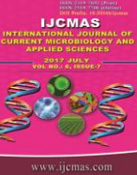


 National Academy of Agricultural Sciences (NAAS)
National Academy of Agricultural Sciences (NAAS)

|
PRINT ISSN : 2319-7692
Online ISSN : 2319-7706 Issues : 12 per year Publisher : Excellent Publishers Email : editorijcmas@gmail.com / submit@ijcmas.com Editor-in-chief: Dr.M.Prakash Index Copernicus ICV 2018: 95.39 NAAS RATING 2020: 5.38 |
Escherichia coli are normal commensals of the intestinal tract. But have been implicated to cause urinary tract infections, wound infections, septicaemias and neonatal meningitis. Extra-intestinal pathogenic Escherichia coli (ExPEC), the specialized strains of E coli that cause most extra-intestinal E. coli infections, represent a major but little appreciated health threat. The present study aimed at characterising the extra intestinal pathogenic E. coli (ExPEC) other than UPEC (UropathogenicE. coli) and to correlate their virulence factors with the clinical diagnosis and these with isolates from stool samples. The antibiotic susceptibility pattern in these isolates was also reviewed. The study was conducted at Dept. of Microbiology. 50 consecutive isolates of E. coli from wound swabs or pus collected from skin and soft tissue infections were characterised. These isolates were screened for colony morphology, serum resistance, haemolysin production, gelatin hydrolysis, cell surface hydrophobicity, and haemagglutination, ESBL and antibiotic profile. Out of 50 isolates from SSTI, 6 (12%) were haemolytic, 16 (32 %) formed mucoid colony and 32(68 %) were non mucoid, 16 (32%) were serum resistant, 3 (6 %) produced gelatinase, 12(24%) were hydrophobic, 37 (74%) produced mannose sensitive haemagglutination & 13 (26%) mannose resistant haemagglutination and 80% were multidrug resistant. E. coli is commonly isolated from SSTI but their importance as etiological agents in these infections is questionable. The present study does demonstrates the virulence potential in the E. coli strains isolated from SSTI. There is a need to further study the virulence factors of these ExPEC (Extra intestinal pathogenic E. coli) in more number of isolates and with the use of molecular techniques.
 |
 |
 |
 |
 |